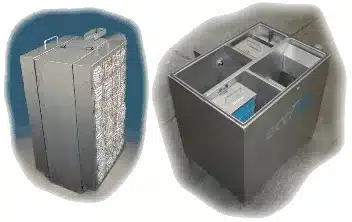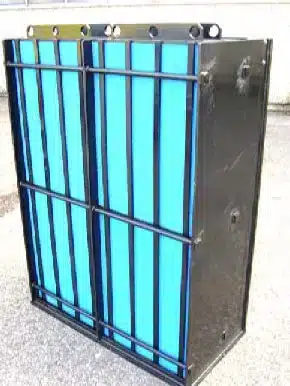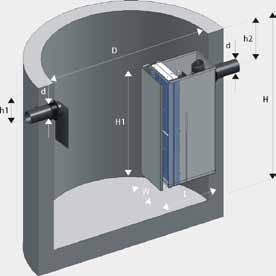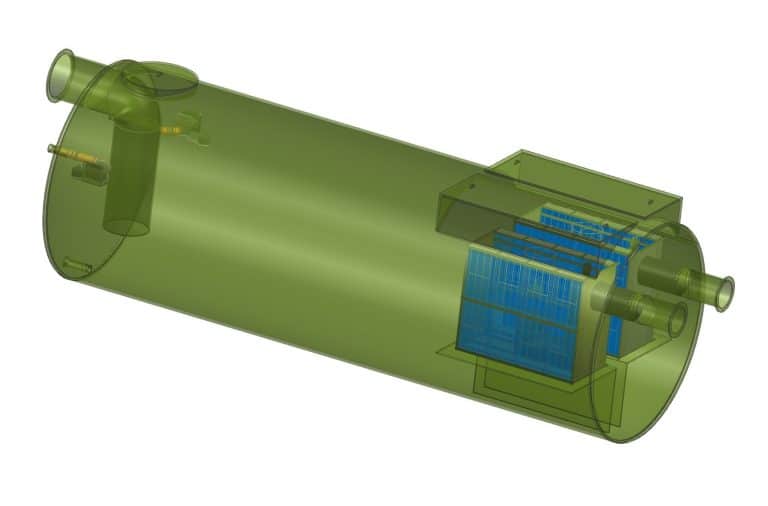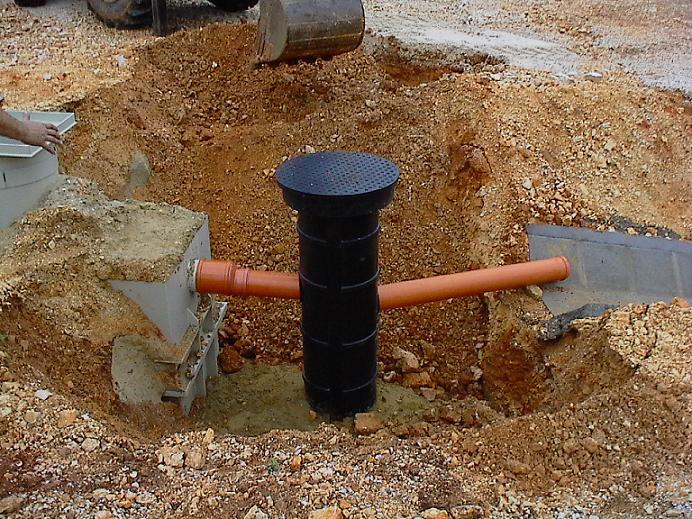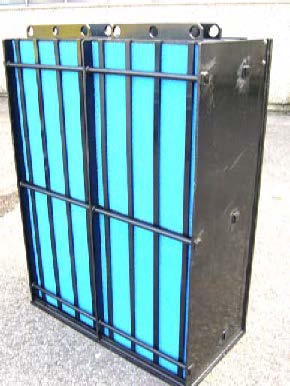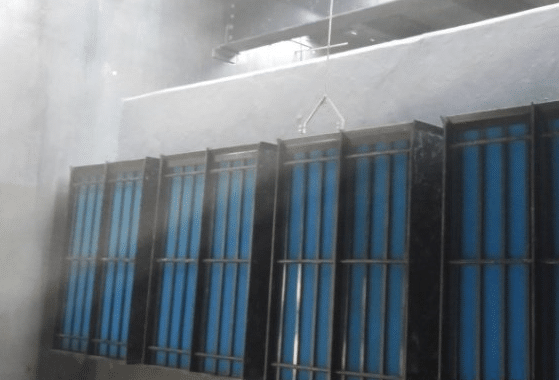Ever wondered if your underground oil tanks are safe for New Hampshire’s waters? Freytech Inc. introduces New Hampshire Below Ground OWS that go beyond just meeting standards. They offer a big step forward in protecting New Hampshire’s underground oil tanks.
Freytech’s Below Ground OWS technology is top-notch, achieving a 5 PPM separation efficiency. This is way better than the North American standard of 10 PPM. They can even separate trace amounts of emulsified oil down to 0.1 PPM.
These systems work well with different types of oil like motor, diesel, gasoline, or jet fuel. By using this tech, New Hampshire businesses do more than follow rules. They lead in taking care of the environment.
Key Takeaways
- Freytech Inc. offers advanced Below Ground OWS for New Hampshire
- 5 PPM separation efficiency, surpassing the 10 PPM standard
- Capable of separating emulsified oil down to 0.1 PPM
- Effective for various hydrocarbons including motor oil and jet fuel
- Enhances environmental protection for underground oil tanks in New Hampshire
Understanding Below Ground Oil Water Separators in New Hampshire
Below ground oil water separators are key in managing oil tanks underground and following environmental laws in New Hampshire. They help protect our environment and ensure safe storage of petroleum.
What are Below Ground OWS?
These units are made to separate oil from water underground. They work well with little upkeep. They can work alone or with bigger systems.
Importance of OWS in Environmental Protection
Oil water separators are crucial for keeping our environment safe. They help companies follow New Hampshire’s strict rules for storing oil. By keeping oil and water apart, they stop harmful substances from getting into soil and water. This protects nature and keeps people healthy.
New Hampshire Regulations for Underground Oil Tanks
New Hampshire has strict rules for underground oil tanks to stop leaks and protect nature. These rules include regular checks, correct installation, and strict monitoring. Following these rules is a must for businesses with underground storage in the state.
Benefits of Freytech Inc.’s Below Ground OWS Technology
Freytech Inc. is a leader in Below Ground OWS innovation. Their oil water separation technology is setting new standards. Let’s look at the main benefits of their system.
Enhanced Coalescing for Superior Separation
Freytech’s Below Ground OWS uses special coalescing media. This media pulls tiny oil droplets together into bigger ones. This makes removing oil from water much easier.
Achieving 5 PPM Separation Efficiency
The system can separate oil from water down to 5 PPM. This is better than the North American standard of 10 PPM. Such high performance means it meets strict hydrocarbon discharge limits.
Handling Various Hydrocarbon Types
Freytech’s technology works with many types of hydrocarbons. It can separate motor oil, diesel, gasoline, and jet fuel from water. This makes it perfect for different industrial uses. Companies can rely on this Below Ground OWS to meet their needs and environmental duties.
New Hampshire Below Ground OWS: Installation and Maintenance
Installing Below Ground OWS in New Hampshire requires careful planning and following local rules. These systems are key in keeping New Hampshire’s petroleum storage safe from oil spills. They are made of strong 304 stainless steel or fiberglass, making them last long and resist corrosion.
Getting the installation right is key for good performance and meeting environmental laws. Experts should do the installation, thinking about soil type, water underground, and easy access for upkeep. Keeping the oil separators in good shape is vital for their long life and effectiveness.
Regular checks are needed to keep the separators working well. This includes looking at the coalescing media, setting skimmers right, and cleaning out sludge and grit chambers. Doing these things keeps the system at 5 PPM separation efficiency, important for New Hampshire’s environmental rules. Managers should plan regular maintenance to avoid problems and stay in line with the laws.
With the right installation and regular upkeep, Below Ground OWS systems can keep New Hampshire’s soil and water safe from oil pollution for many years.
Addressing Soil and Groundwater Contamination Risks
Keeping our environment safe from leaking underground oil tanks is vital. These tanks can pollute soil and groundwater if not handled right. Let’s look at ways to stop and fix these problems.
Preventing Leaks from Underground Oil Tanks
Stopping leaks before they start is the best defense. Regular checks can spot small issues early. Look for corrosion or damage on tanks. Use leak detection systems to warn you if oil leaks.
Remediation Strategies for Contaminated Sites
If oil tanks leak and pollute groundwater, act fast. Remediation might mean removing polluted soil and cleaning the groundwater. Using advanced oil-water separators can help clean spills and stop pollutants from spreading.
Regular Monitoring and Inspection Protocols
Set a strict schedule for checking tanks. Test their strength often and make sure everything works right. Keep records of all checks and upkeep. This way, you can avoid expensive cleanups and keep our water safe from oil pollution.
Choosing the Right Below Ground OWS for Your Needs
Choosing the right Below Ground Oil Water Separators is key. It depends on your site’s unique needs. These include flow rates, hydrocarbons types, and environmental conditions.
When looking at oil tank removal in New Hampshire, consider the separator’s material. Stainless steel is durable and resistant to corrosion. Fiberglass is light, easy to handle, and great against chemicals. Flow rates vary from 1 to 100 gallons per minute or more.
For sites needing to fix old oil tanks, you might need extra features. Integrated sumps handle heavy solids, and slant rib clarification plates improve separation. These features help meet environmental standards and keep groundwater clean.
Freytech Inc. offers custom solutions for oil-water separation. They can help you pick the right Below Ground Oil Water Separators. They ensure you follow New Hampshire laws and get the best performance for your needs.
Compliance with New Hampshire Petroleum Storage Regulations
New Hampshire takes petroleum storage seriously. The state has strict rules for Below Ground Oil Water Separators (OWS). These rules help protect the environment and keep people safe.
State-Specific Requirements for Below Ground OWS
In New Hampshire, all underground oil tanks must be registered. Owners need to install leak detection systems. The state also sets specific building standards for these facilities. Meeting these rules is key for Below Ground OWS compliance.
Permit Processes and Documentation
Getting the right permits is crucial. You’ll need to fill out forms and provide detailed plans. The state reviews these carefully. Keep all your papers in order. Good records show you’re following New Hampshire petroleum storage laws.
Regular Reporting and Compliance Checks
Staying in line with environmental regulations for oil tanks means regular checks. New Hampshire requires frequent inspections. You must report any issues right away. Keep a log of all maintenance. This proves you’re taking care of your Below Ground OWS system.
These separators are crucial in storm water systems. They process runoff to meet the US EPA’s Clean Water Act standards. With effective oily water treatment, facilities protect the environment and dodge big fines.


